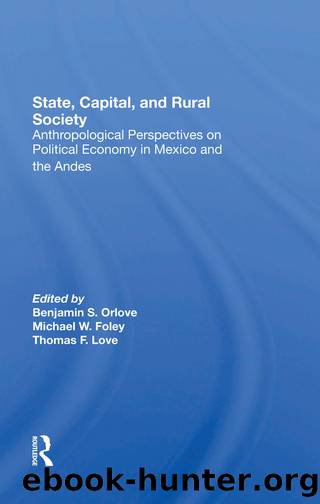State, Capital, And Rural Society by Ben Orlove Michael W Foley Thomas F Love

Author:Ben Orlove, Michael W Foley, Thomas F Love [Ben Orlove, Michael W Foley, Thomas F Love]
Language: eng
Format: epub
Tags: Social Science, Anthropology, General
ISBN: 9781000313109
Google: cbutDwAAQBAJ
Publisher: Routledge
Published: 2019-09-05T03:49:07+00:00
Summary and Conclusions
The Problem-Set and Theories of Underdevelopment
By adopting an articulation of modes of production framework, much of the overall historical and regional dynamics underlying the persistence of an otherwise anomalous system of partly commercialized petty commodity producing households in southwestern highland Peru has been clarified.
Despite close ties with some of the most modem sectors of Peruvian society in each period since the conquest, the expected capitalist differentiation of the Arequipa peasantry has not taken place. Taking the relative equivalence of landholding as one measure of differentiation, relations are slightly more equivalent now than they were in the early 1940s when Carnation entered the scene (Love 1983)!
what has limited the development of capitalist relations of production in the campiña of Arequipa? That is to say, what has hindered the separation of these fee-simple, direct producers from their means of production?
The modernization approach suggests that "obstacles to development", consisting of "traditional" elements of economic, social and cultural organization of local-level rural peoples, have hindered the development of rational and efficient combinations of land, labor and capital and associated institutional transformation. Modernization theory does little, however, to account for the origins or persistence of such obstacles, especially in the face of pervasive linkages with "modernizing" forces.
Despite a diversity of perspectives within dependency theory (Palma 1978; de Janvry and Crouch ms.), it improves on the modernization approach by theoretically incorporating the acknowledged imbalance in transfers of labor and goods between underdeveloped and developed sectors. It pays more attention to the historical depth of existing patterns of underdevelopment. Also, it suggests that to account for the persistence of such underdeveloped rural sectors requires locating them within the larger national and international contexts in which they function as dependent satellites serving metropolitan needs. Understanding the initial and continuing advantages to Carnation/Leche Gloria of the persistence of production units relying on cheap household and immigrant labor would be sufficient to account for this case of the development of underdevelopment.
By assuming that surplus is everywhere and always appropriated from satellites to metropoles, however, dependency theory subsumes a wide variety of relations of linkage under a single rubric of dependency. Worse, by focusing on appropriation of surpluses between regions or nation-states, little attention is paid to the wide variety of ways such surpluses are extracted (cf. Deere and de Janvry 1979). The different positions of actors within dependent societies are underemphasized, as are internal processes in general. This is especially true in discussions of peasantries, where processes of internal differentiation and conflict tend to be minimized in favor of wider relations of elite domination and peasant subordination (see Fonseca 1985). Dependency theories would tell us little about the ways Arequipa smallholders have offset differentiation, such as the developing relations they have with a class of immigrant highland laborers.
The articulation of modes of production approach has emerged from dependency theory attempting to correct some of these deficiencies in accounting for the wide variety of current underdevelopment situations. By grounding analysis in production rather than exchange, class structures and internal processes of both dominant and subordinate systems are highlighted.
Download
This site does not store any files on its server. We only index and link to content provided by other sites. Please contact the content providers to delete copyright contents if any and email us, we'll remove relevant links or contents immediately.
| Natural Resource Extraction | Oil & Energy |
Life 3.0: Being Human in the Age of Artificial Intelligence by Tegmark Max(5548)
The Sports Rules Book by Human Kinetics(4379)
The Age of Surveillance Capitalism by Shoshana Zuboff(4276)
ACT Math For Dummies by Zegarelli Mark(4043)
Unlabel: Selling You Without Selling Out by Marc Ecko(3658)
Blood, Sweat, and Pixels by Jason Schreier(3615)
Hidden Persuasion: 33 psychological influence techniques in advertising by Marc Andrews & Matthijs van Leeuwen & Rick van Baaren(3552)
The Pixar Touch by David A. Price(3431)
Bad Pharma by Ben Goldacre(3422)
Urban Outlaw by Magnus Walker(3392)
Project Animal Farm: An Accidental Journey into the Secret World of Farming and the Truth About Our Food by Sonia Faruqi(3212)
Kitchen confidential by Anthony Bourdain(3080)
Brotopia by Emily Chang(3049)
Slugfest by Reed Tucker(2997)
The Content Trap by Bharat Anand(2917)
The Airbnb Story by Leigh Gallagher(2851)
Coffee for One by KJ Fallon(2630)
Smuggler's Cove: Exotic Cocktails, Rum, and the Cult of Tiki by Martin Cate & Rebecca Cate(2520)
Beer is proof God loves us by Charles W. Bamforth(2453)
